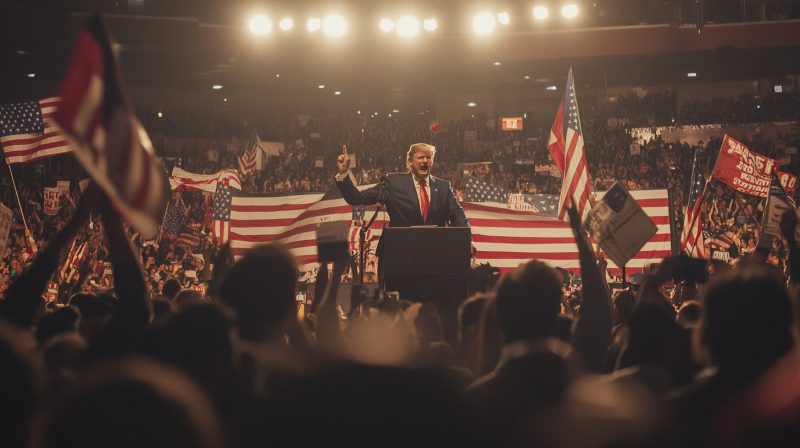Former President Donald Trump took center stage at Madison Square Garden this past weekend for a rally that drew thousands of supporters. The event was characterized by fervent nationalism, a reflection of his controversial rallies during his presidency, and painted a grim picture of the ideological divides that continue to grip the nation.

Echoes of the Past: The Rhetoric Returns
The rally at MSG was more than just a campaign event—it was a stark reminder of the rhetoric that defined Donald Trump’s previous tenure. He delivered an impassioned speech filled with claims about a rigged electoral system, attacks on political opponents, and promises to “drain the swamp,” echoing the rhetoric that once inflamed deep divisions in the country.
Trump’s language reflected his usual uncompromising stance on immigration, foreign policy, and his disdain for the current administration. He spoke out against “soft leadership,” called for tougher borders, and reiterated his controversial stance on law and order. To many, the rally was an eerie callback to the rhetoric that dominated his 2016 campaign, invoking themes of national greatness paired with a distrust of political elites.
Trump also made disparaging remarks about various communities, including Puerto Ricans, accusing them of mismanaging aid provided after Hurricane Maria and suggesting they were undeserving of further federal support. Such comments drew loud cheers from his supporters but were met with widespread condemnation from critics who viewed the statements as offensive and dismissive of the struggles faced by marginalized communities. In addition to Puerto Ricans, he insulted other minority groups, further deepening concerns about the divisive nature of his rhetoric.
Adding fuel to the controversy, a comedian at the rally, Tony Hinchcliffe, made a crude joke referring to Puerto Rico as a “floating island of garbage.” This statement was met with backlash from both sides of the political aisle, prompting Republican lawmakers, such as New York Representative Anthony D’Esposito, to publicly distance themselves from the comment. D’Esposito emphasized the value and rich culture of Puerto Rico, while other Republicans like María Elvira Salazar and Rick Scott expressed their disgust over the joke, calling it “racist” and “in poor taste”.
The Trump campaign itself also tried to distance from Hinchcliffe’s remarks, with a campaign adviser stating, “This joke does not reflect the views of President Trump or the campaign.” The backlash has led to a notable amount of backpedaling from the campaign and Republican figures who found themselves needing to respond to the controversy sparked by the comedian’s comments.
Crowd Enthusiasm vs. Broader Reactions
The rally attendees were visibly enthusiastic, waving flags, chanting slogans, and holding up banners supporting Trump’s 2024 presidential bid. For the thousands gathered, Trump’s words provided a sense of direction amid what they perceive as chaos under the current leadership. The energy in the room was palpable as the former president spoke of “taking back America” and promised a return to an era of “prosperity and strength.”
However, the rally did not go without criticism. Many outside Madison Square Garden and across the country viewed the event with concern, seeing it as a revival of divisive and inflammatory rhetoric that has already led to dangerous consequences. The specter of January 6th loomed large, with some critics pointing out the similarities in language and tone. Security was tight at the venue, reflecting concerns that Trump’s words could incite unrest.
Rewriting History or Addressing Issues?
Trump used the platform to paint his past administration in a positive light, attempting to rewrite history by emphasizing economic successes, the construction of the border wall, and his administration’s handling of international relations. He framed the current state of the country as one of decline and decay, comparing it unfavorably to what he described as the “successes” of his term.
Critics argue that this selective retelling glosses over the controversies and failures that plagued his presidency, including his handling of the COVID-19 pandemic and the fallout from the Capitol riots. For many, the rally was not just a campaign event but an attempt to control the narrative heading into the upcoming election, appealing to the nostalgic sentiment of his core base while disregarding the broader consequences of his past actions.
The Divide Deepens
The Madison Square Garden rally highlighted the deep political and cultural divides that continue to fracture the United States. Supporters viewed Trump as a savior figure who could restore what they perceive as lost values and bring back economic prosperity. Meanwhile, detractors saw his words as dangerous, divisive, and a potential threat to democratic norms.
Trump’s messaging at the rally was clear: he believes the country has lost its way, and he is the only one who can bring it back on course. This narrative resonated deeply with his supporters, many of whom expressed a deep distrust of current political leaders and a desire for a return to what they see as the strong leadership of the past.
Looking Ahead: What This Means for 2024
With the 2024 election looming, Trump’s rally at Madison Square Garden was an unmistakable indication of his intent to remain at the forefront of American politics. The event underscored his ability to draw large crowds and maintain loyalty among his base, even as he faces multiple legal battles and significant criticism.
For many Americans, the rally was a dark reminder of the volatility and division of recent years—a past that some are eager to move beyond, while others seem ready to embrace it once more. As Trump continues his campaign, the nation faces a pivotal decision: whether to re-embrace the controversial leadership style of his previous administration or move toward a different vision for the future.
The Madison Square Garden rally made one thing clear: Donald Trump’s influence over American politics remains as strong as ever, and the ideological battles that defined his first term are far from over. Whether his message will resonate beyond his dedicated supporters and shift the broader electorate remains to be seen.
